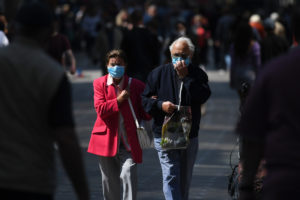
It is clear that one’s chronological age is not the most crucial determinant of one’s susceptibility to aquiring or dying from Covid-19 (see my blog post of June 24). Rather biological age (reflecting the actual physiology of a person and how well that person is functioning) appears to be much more important. This nuance is probably lost on many who are leading and following the widespread popular movements around the country to resist outdoor mask-wearing, social distancing and any other restraint upon free-wheeling opening up of the economy. It’s quite clear that the boisterous element of resistors to most any form of self-restraint are more than willing to sacrifice some of us (understood by them to be the elderly) for the freedom of those under 65 to unmask, gather at close quarters, and drink beer at their local tavern.
Stigmatizing Old People
Misplaced as it is, given that the disease affects and kills young with comprised health as well as elderly, this obvious ageism is a serious problem and could leave us with long-term societal scars. Clumping all adults chronologically aged 65 and older stigmatizes the entire group, regardless of actual susceptibility to Covid-19. Partioning society into clear groups of old that are assumed to be likely to contract the disease and young who are not (even though the data increasingly disapproves the premise), can be, according to Dr. Gilad Hirschberger, associate professor of psychology at the Interdisciplinary Center in Israel, a coping mechanism in the face of this pandemic. It provides people under 65 with a form of “psychological protection,” he says. “We can say, it’s not us.”
But this discrimination based purely on one’s year of birth disregards the feelings of those who are being told to take care of themselves by sheltering while the rest of the world goes about its business. I can personally testify to the fact that, after nearly 4 months of sheltering in place, except for the occasional drive to Trader Joe’s for the senior hour grocery restocking, I most definitely want to re-enter the real world. I’m more than a little disheartened to see younger people resuming their activities. It is especially disconcerting to watch the re-opening in near total disregard for the need for masks and distancing, while infections sky-rocket (certainly to be followed in the coming weeks by new hospitalizations and deaths).
Rationing Healthcare by Age
Professor Hirschberger also warns of the lingering threat posed by possible scarcities of hospital beds, ICU space and ventillators. Especially in the event of recurring waves like the one presently being experienced widely in the US, suggestions could again arise to enact guidelines to prioritize younger people over the elderly, who may be less deserving of livesaving health care. “You have to choose between saving the economy and saving older people. It really places people in this moral dilemma,” warns Hirschberger. Such considerations of rationing healthcare, bound to occur as hospitals become stressed again, clearly devalue the lives of the elderly.
The Dangers of “Othering” the Elderly
This wide-spread “othering” of older adults by so many, even by the Trump Administration’s policy of encouraging opening in spite of careless adherence to proper social distancing and masking, is actually harming all of us. “Ageism is a strange phenomenon,” says AARP CEO Jo Ann Jenkins to Rolling Stone. “It’s prejudice against your future self. ” Instead of fostering an attitude of “we’re all in this together” the “othering” of the elderly, just like “othering” Jews by Nazi Germany and “othering” Blacks by many White Americans and American institutions, can produce an existential threat to a society’s ability to cohere in the face of future threats.
Vice President Hubert H. Humprhey, the Democratic nominee for President in 1968, said “the ultimate moral test of any government” is how it treats those in the twilight their lives. And the eminent anthropologist Margaret Mead offered a similar reflection upon the inherrent value placed in any civilization upon taking care of those in need. Once when asked what she felt was the earliest sign of civilization among humans, she answered, “a healed femur.” Rather than leaving the victim of this broken leg to die untended, Mead explained, the victim’s community apparently took care of her, hunting and gathering for her, until she mended and could resume her role in the work of the society.
When we chafe to go back to normal, all but heedlessly leaving the vulnerable to fend for themselves, often contracting this horrid disease and even dying, we diminish ourselves as a society.
“Humanity’s success has long depended upon our elders’ help. Today our moral and ethical success will be determined by whether we return the favor. If we sacrifice the health of our older people and those who are ill for an ephemeral economy based on stock market futures and shareholder profits, what will we gain? Not our humanity. Instead, we will lose it.”Jayur Madhusudan Mehta

I really liked the Margaret Mead quote. Taking care of someone who was injured is a better measure of civilization than a wall or a document.
Yes, I was struck by Mead’s observation, as well. We are “civilized” to the extent that we place a high moral value upon the wellbeing of the whole community.
I was hoping we were past this, but on July 2, this from the Wash Post
“Perhaps most chillingly, at the urging of doctors and advisers, state officials this week activated “crisis standards of care” protocols, which determine for hospitals which patients get ventilators and care as the system becomes overwhelmed under the crush of patients.“